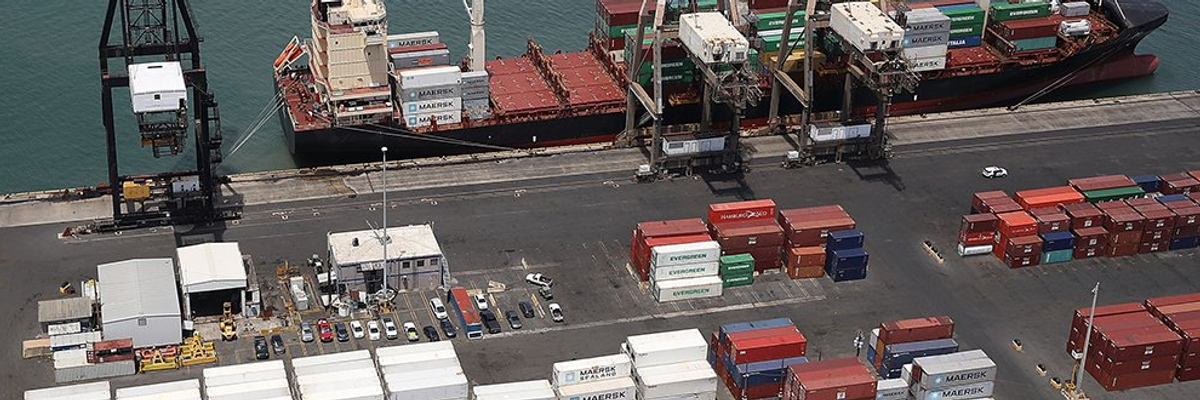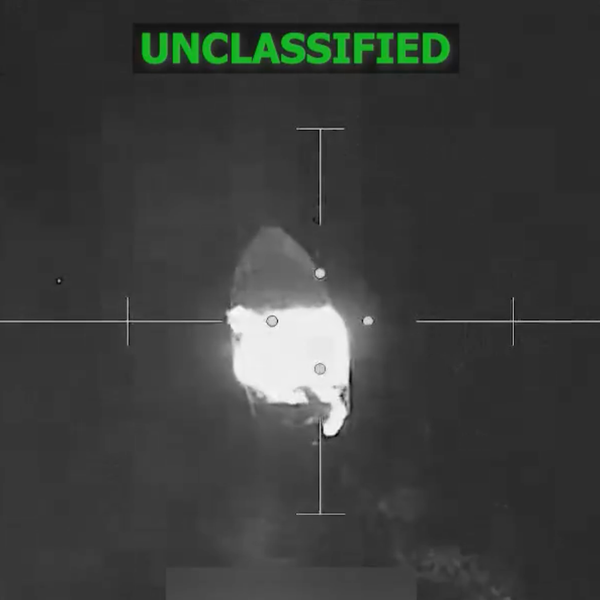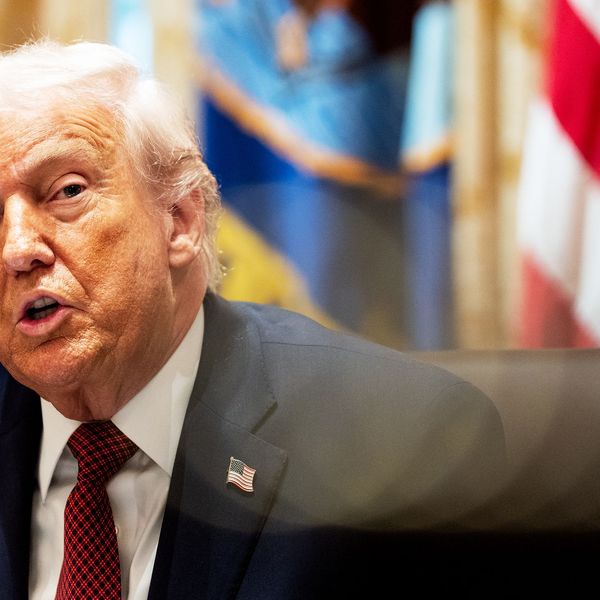
Mountains of aid have been piling up in recent days at San Juan's ports. Critics say an earlier deployment of federal resources by the White House would have kept aid flowing to Hurricane Maria survivors once it arrived. (Photo: @NationalPost/Twitter)
Trump Slammed for Slow Maria Response As Aid Piles Up on San Juan's Docks
Retired general who oversaw Katrina recovery says Trump should have deployed resources more quickly
As the humanitarian situation remains dire in Puerto Rico, thousands of shipping containers on docks in San Juan are offering a visual representation of the widespread mismanagement of recovery efforts by the Trump administration following Hurricane Maria's destruction.
Though President Trump finally agreed to waive the Jones Act on Thursday in order to allow ships to bring more food, water, and fuel to the island, the long-awaited decision may not be immediately helpful to residents--as the lack of aid getting to survivors appears to be due to logistical blunders in addition to bureaucratic decision-making.
About 9,000 20-foot containers have arrived at a maritime terminal in San Juan in the past few days, following the storm's landfall on September 20. A lack of vehicles and drivers has made it impossible to distribute the aid. With blocked roads, a fuel shortage, and cell phone towers down across the commonwealth, the thousands of federal workers who have arrived on the island and the Puerto Rican government has been unable to create an efficient delivery system.
"It's kind of like Katrina: We got it. We got it. Oh, shit, send in the cavalry. This is a hit on White House decision making."--Ret. Lt. Gen. Russel Honore
While the severity of the storm combined with Puerto Rico's aged, fragile infrastructure are part of what led to the especially challenging recovery effort, critics have said President Trump's lackluster and delayed responses to the disaster have led to a slow mobilization of federal resources which could have avoided the logjam in San Juan's ports.
Retired lieutenant general Russel Honore, who was called in to manage recovery efforts in New Orleans after days of inaction by the Bush administration following Hurricane Katrina in 2005, said Thursday in an interview with Bloomberg that the federal government should have sent relief workers and aid ahead of the storm.
Honore said the U.S. military, particularly the Northern Command, should be deployed to Puerto Rico to oversee the recovery, which is currently being managed by thousands of federal workers including 600 from the Federal Emergency Management Administration (FEMA):
Only the military has the ability to move supplies quickly onto the island as many ports remain closed, he said--what he called "expeditionary logistics," a mix of specialized ships, aircraft and other equipment that the National Guard can't match. Before the storm hit, the federal government should have positioned more personnel in Puerto Rico, he said.
On Wednesday the Department of Defense announced that brigadier general Rich Kim was being sent to Puerto Rico to establish a command center aimed at getting aid efforts underway on land. The move comes after criticism from the mayor of San Juan that relief workers had "no marching orders" and were mainly assessing damage earlier in the week.
"It's kind of like Katrina: We got it. We got it. Oh, shit, send in the cavalry," said Honore told Bloomberg. "This is a hit on White House decision making."
An Urgent Message From Our Co-Founder
Dear Common Dreams reader, The U.S. is on a fast track to authoritarianism like nothing I've ever seen. Meanwhile, corporate news outlets are utterly capitulating to Trump, twisting their coverage to avoid drawing his ire while lining up to stuff cash in his pockets. That's why I believe that Common Dreams is doing the best and most consequential reporting that we've ever done. Our small but mighty team is a progressive reporting powerhouse, covering the news every day that the corporate media never will. Our mission has always been simple: To inform. To inspire. And to ignite change for the common good. Now here's the key piece that I want all our readers to understand: None of this would be possible without your financial support. That's not just some fundraising cliche. It's the absolute and literal truth. We don't accept corporate advertising and never will. We don't have a paywall because we don't think people should be blocked from critical news based on their ability to pay. Everything we do is funded by the donations of readers like you. Will you donate now to help power the nonprofit, independent reporting of Common Dreams? Thank you for being a vital member of our community. Together, we can keep independent journalism alive when it’s needed most. - Craig Brown, Co-founder |
As the humanitarian situation remains dire in Puerto Rico, thousands of shipping containers on docks in San Juan are offering a visual representation of the widespread mismanagement of recovery efforts by the Trump administration following Hurricane Maria's destruction.
Though President Trump finally agreed to waive the Jones Act on Thursday in order to allow ships to bring more food, water, and fuel to the island, the long-awaited decision may not be immediately helpful to residents--as the lack of aid getting to survivors appears to be due to logistical blunders in addition to bureaucratic decision-making.
About 9,000 20-foot containers have arrived at a maritime terminal in San Juan in the past few days, following the storm's landfall on September 20. A lack of vehicles and drivers has made it impossible to distribute the aid. With blocked roads, a fuel shortage, and cell phone towers down across the commonwealth, the thousands of federal workers who have arrived on the island and the Puerto Rican government has been unable to create an efficient delivery system.
"It's kind of like Katrina: We got it. We got it. Oh, shit, send in the cavalry. This is a hit on White House decision making."--Ret. Lt. Gen. Russel Honore
While the severity of the storm combined with Puerto Rico's aged, fragile infrastructure are part of what led to the especially challenging recovery effort, critics have said President Trump's lackluster and delayed responses to the disaster have led to a slow mobilization of federal resources which could have avoided the logjam in San Juan's ports.
Retired lieutenant general Russel Honore, who was called in to manage recovery efforts in New Orleans after days of inaction by the Bush administration following Hurricane Katrina in 2005, said Thursday in an interview with Bloomberg that the federal government should have sent relief workers and aid ahead of the storm.
Honore said the U.S. military, particularly the Northern Command, should be deployed to Puerto Rico to oversee the recovery, which is currently being managed by thousands of federal workers including 600 from the Federal Emergency Management Administration (FEMA):
Only the military has the ability to move supplies quickly onto the island as many ports remain closed, he said--what he called "expeditionary logistics," a mix of specialized ships, aircraft and other equipment that the National Guard can't match. Before the storm hit, the federal government should have positioned more personnel in Puerto Rico, he said.
On Wednesday the Department of Defense announced that brigadier general Rich Kim was being sent to Puerto Rico to establish a command center aimed at getting aid efforts underway on land. The move comes after criticism from the mayor of San Juan that relief workers had "no marching orders" and were mainly assessing damage earlier in the week.
"It's kind of like Katrina: We got it. We got it. Oh, shit, send in the cavalry," said Honore told Bloomberg. "This is a hit on White House decision making."
As the humanitarian situation remains dire in Puerto Rico, thousands of shipping containers on docks in San Juan are offering a visual representation of the widespread mismanagement of recovery efforts by the Trump administration following Hurricane Maria's destruction.
Though President Trump finally agreed to waive the Jones Act on Thursday in order to allow ships to bring more food, water, and fuel to the island, the long-awaited decision may not be immediately helpful to residents--as the lack of aid getting to survivors appears to be due to logistical blunders in addition to bureaucratic decision-making.
About 9,000 20-foot containers have arrived at a maritime terminal in San Juan in the past few days, following the storm's landfall on September 20. A lack of vehicles and drivers has made it impossible to distribute the aid. With blocked roads, a fuel shortage, and cell phone towers down across the commonwealth, the thousands of federal workers who have arrived on the island and the Puerto Rican government has been unable to create an efficient delivery system.
"It's kind of like Katrina: We got it. We got it. Oh, shit, send in the cavalry. This is a hit on White House decision making."--Ret. Lt. Gen. Russel Honore
While the severity of the storm combined with Puerto Rico's aged, fragile infrastructure are part of what led to the especially challenging recovery effort, critics have said President Trump's lackluster and delayed responses to the disaster have led to a slow mobilization of federal resources which could have avoided the logjam in San Juan's ports.
Retired lieutenant general Russel Honore, who was called in to manage recovery efforts in New Orleans after days of inaction by the Bush administration following Hurricane Katrina in 2005, said Thursday in an interview with Bloomberg that the federal government should have sent relief workers and aid ahead of the storm.
Honore said the U.S. military, particularly the Northern Command, should be deployed to Puerto Rico to oversee the recovery, which is currently being managed by thousands of federal workers including 600 from the Federal Emergency Management Administration (FEMA):
Only the military has the ability to move supplies quickly onto the island as many ports remain closed, he said--what he called "expeditionary logistics," a mix of specialized ships, aircraft and other equipment that the National Guard can't match. Before the storm hit, the federal government should have positioned more personnel in Puerto Rico, he said.
On Wednesday the Department of Defense announced that brigadier general Rich Kim was being sent to Puerto Rico to establish a command center aimed at getting aid efforts underway on land. The move comes after criticism from the mayor of San Juan that relief workers had "no marching orders" and were mainly assessing damage earlier in the week.
"It's kind of like Katrina: We got it. We got it. Oh, shit, send in the cavalry," said Honore told Bloomberg. "This is a hit on White House decision making."

